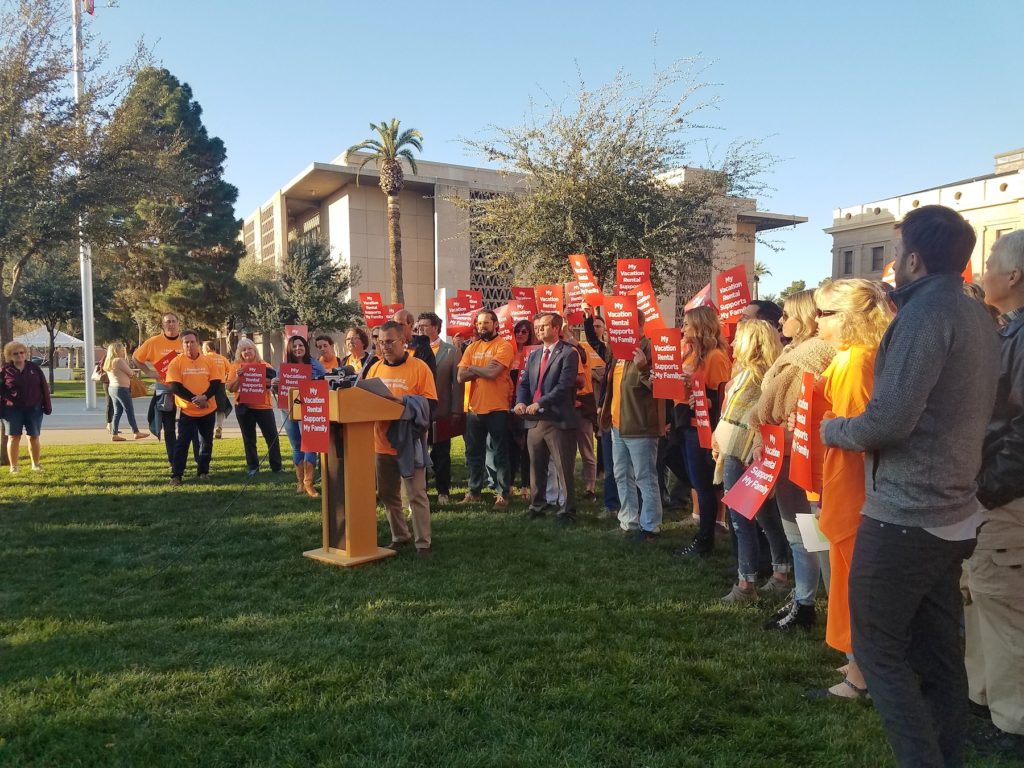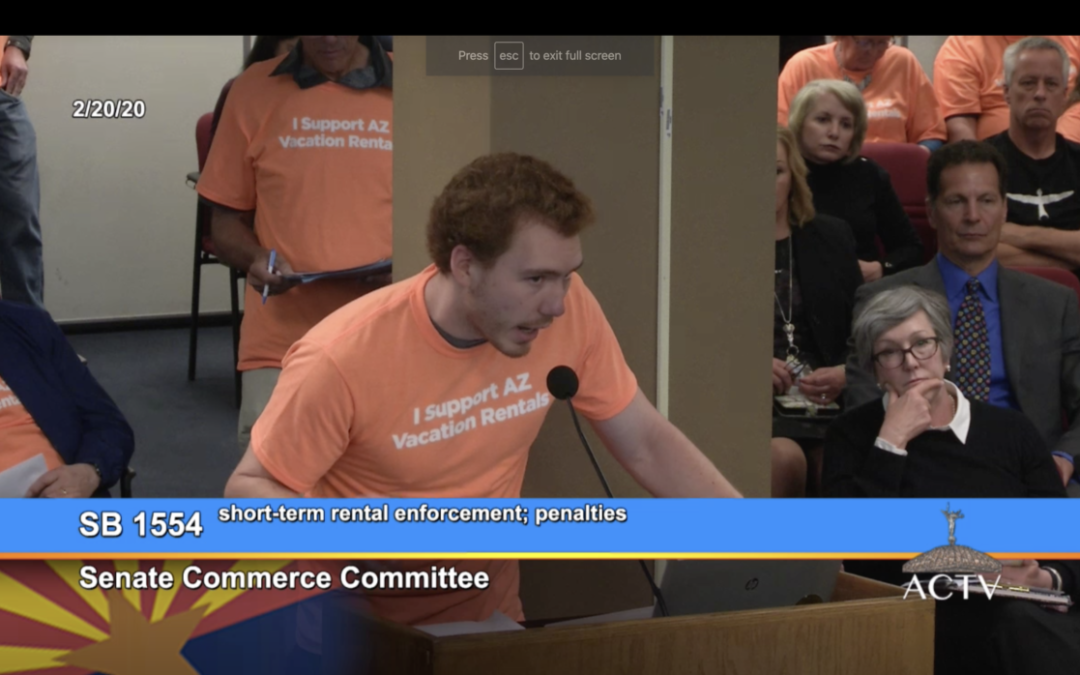Updated on May 1, 2023
Editor’s Update 2023: After this story was published, the 2020 AZ legislative session was interrupted due to Covid. Arizonans for Responsible Tourism, a statewide short-term rental association founded in 2021, later advocated for compromise bill SB1168, which passed in 2022. Learn more about AZRT and SB1168 here.
“I am the big scary corporate entity who invests all of his money here, hires all Arizona employees, and worked 22 hours a day for two years straight to make something of myself and buy properties,” said 24-year-old Colten Bacs to a packed room in front of the Arizona State Senate Commerce Committee on February 20, 2020. “I bought these properties when I thought the state of Arizona had my back.”
The committee was considering Senator Brophy-McGee’s SB1554, which would allow a local government to restrict a short-term rental (STR) or vacation rental that is not a person’s primary or one additional residence. An approved amendment would additionally bar corporate entities from operating short-term rentals without a city or town’s approval, a particularly problematic provision for the thousands of individuals like Colten who host through LLCs and S-corps as a standard and smart practice.
Born and raised in Phoenix and a 2018 graduate of Arizona State University, Colten has built a handful of small businesses with nothing but $500 he saved from his high school job at Safeway. All of his businesses are based in Phoenix and employ at least 10 locals at any given time.
Read more: Linda Curry: Setting the standard for Arizona short-term rentals

Growing Up with Short-Term Rentals
Colten started in short-term rentals with his mom, Victoria, while he was at ASU earning degrees in business, law, and global politics. They rented his childhood home and a second he lived in briefly, which they manage themselves with the help of five part-time contractors.
When Arizona passed the preemption bill in 2016 preventing cities and towns from overregulating STRs, he felt safe continuing to try and grow his small hosting business, so he got his real estate license to save on agent costs and purchased a third property.
The thing Colten loves most about hosting is meeting guests from around the world. He’s often invited to join them for dinner, which he does as much as he can. “I find it all to be fascinating, to be honest, that a couple of houses in Arizona can host so many different people and be loved by so many different people at the same time,” he said.
Much of the reason he gets such great guests is their thorough vetting process that weeds out potential problem visitors before they book. They also monitor their properties with exterior cameras that track arrivals and noise levels, and they rapidly respond to any potential disturbances before they become a nuisance to neighbors.
“We’ve had maybe two or three complaints ever through hundreds and hundreds of bookings, and all of them have been resolved by asking the guests to be quieter, and they have,” he said.
See tips and guides for hosting great guests and more in our Resource Library >
Arizona’s short-term rental laws
Even with their self-imposed practices, he also noted the resources his neighbors and all Arizona communities have in their existing nuisance ordinances and enforcement mechanisms.
Colten estimates the pair has invested almost $2 million between the nuisance prevention technology, renovations and repairs, upgrades, the home purchases themselves, and the costs of keeping them maintained at a higher standard than all others on their blocks.
It’s a big investment, he said, and they made those investments with the guarantee from the state that it would protect them from city overreach. He felt so betrayed by SB1554, he was compelled to make the passionate testimony to the Senate committee and participate in the capitol rally held that morning by the Vacation Rental Alliance of Arizona (VRAAZ).
“It’s a big slap in the face to not even three years later be told that maybe we’re going to go a different direction and the investments you made based on certain criteria are potentially over,” he said.
Read more: STR Manager Sara Alper Speaks Up for Entrepreneurs in Sedona
If the Senate bill passes as is, Colten predicts the consequences will be broad and extreme. “The question is how bad will it be?” he asked. Should cities take the open door to overregulate STRs, not only would he and his mom not be able to do what they do, the same could happen for hundreds of other homeowners in a single blow. “I can’t imagine that not driving a market crash,” he added.

Colten and Victoria are now working to keep that from happening to them and hosts around the state by getting more involved and making sure their voices are heard at the capitol.
The biggest thing he wants people to know is that just because someone runs a business does not mean they’re a huge, multinational conglomerate that is rolling in the money and out to hurt people.
•••
GET UPDATES

